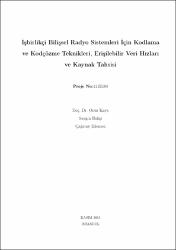| dc.contributor.author | Kaya, Onur | en_US |
| dc.contributor.author | Bakşi, Saygın | en_US |
| dc.contributor.author | Edemen, Çağatay | en_US |
| dc.date.accessioned | 2020-05-12T08:17:27Z | |
| dc.date.available | 2020-05-12T08:17:27Z | |
| dc.date.issued | 2013-10-01 | |
| dc.identifier.citation | Kaya, O., Bakşi, S. & Edemen, Ç. (2013). İşbirlikçi bilişsel radyo sistemleri için kodlama ve kod çözme teknikleri, erişilebilir veri hızları ve kaynak tahsisi. Tübitak, 1-117. | en_US |
| dc.identifier.uri | https://hdl.handle.net/11729/2312 | |
| dc.identifier.uri | https://app.trdizin.gov.tr/proje/TVRNME56azU | |
| dc.description.abstract | İşbirlikli iletişim ve bilişsel radyo, yeni nesil kablosuz haberleşme ağlarında kapasite ve iletişim kalitesinin artırımı için kilit tekniklerdir. Bu tekniklerin her ikisi de, çevrelerinin farkında olan ve bu farkındalığı gönderim stratejilerini belirlerken kullanabilen akıllı düğümlere dayalı olduğundan, yeni nesil protokollerin tasarımında bir arada ele alınmaları son derece doğaldır. Bu projenin temel amacı, kablosuz ağlarda bu iki tekniği bir arada kullanabilen yeni işbirliği stratejileri geliştirmek, ve bunlar ile elde edilebilecek veri hızlarını özkaynakların verimli tahsisi ile eniyilemektir. Projede, iki kullanıcı - tek alıcılı, üç kullanıcı - tek alıcılı, çok kullanıcı - tek alıcılı ve çok kullanıcı - çok alıcılı olmak üzere dört farklı işbirlikli çoklu erişim modeli ele alınmıştır. Bunların ilk üçünde, birincil kullanıcılara belirli veri hızı garantileri sağlanırken, ikincil kullanıcıların ya da tüm sistemin veri hızlarını eniyileyen güç tahsisi algoritmaları geliştirilmiştir. Çok kullanıcı - tek alıcılı sistemde, birincil ve ikincil kullanıcılar arası işbirliği çiftler halinde modellendiğinden, ayrıca en iyi işbirlikçi ortak seçimi de ele alınmıştır. Çok kullanıcı – çok alıcılı hücresel sistem modelinde ise, kullanıcıların hem işbirlikçi ortak, hem de alıcı seçimini güç tahsisi ile birlikte veri hızlarını en büyükleyecek şekilde seçebilecekleri bir kaynak tahsisi algoritması geliştirilmiş, hücre kenarındaki kullanıcılar arasında işbirliğini ve alıcı seçimini mümkün kılmak amacıyla özgün bir zıt kısmi frekans tekrarı modeli önerilmiştir. Ele alınan tüm problemlerde, veri hızlarının aynı miktarda kaynak kullanılmasına karşın yardımlaşma sayesinde kayda değer biçimde artırılabildiği gösterilmiştir. Sonuç olarak, proje kapsamında bilgi kuramsal yaklaşımlarla elde edilen temel sonuçlar bilişsel radyo ile işbirlikli iletişimin kablosuz ağlarda bir arada ele alınmasının faydasına ve gerekliliğine işaret etmektedir. | en_US |
| dc.description.abstract | Cooperative communication and cognitive radio are key techniques for increasing the capacity and quality of service of the next generation wireless communication networks. Both of these techniques rely on intelligent nodes, which are aware of their surroundings, and are capable of using this awareness to determine their transmit strategies. Therefore, it is quite natural to consider the joint use of these techniques in the design of next generation communication protocols. The main goal of this project is to develop new cooperation strategies capable of combining cognition and cooperation in wireless networks, and to optimize the rates achievable by these strategies via efficient utilization of the available resources. In this project, we consider four different cooperative multiple access models: two user - single receiver; three user - single receiver, multi user - single receiver and multi user – multi receiver models. The first three models aim to optimize either the rates of the secondary users, or the sum rate of the system, under hard single user rate guarantees for primary users, via power control. In the multi user - single receiver model, the cooperation among the primary and secondary users is modeled as pairwise cooperation, hence, in this scenario, we also solve the optimal partnering problem. In the multi user - multi receiver cellular model, we obtain the jointly optimal power allocation, receiver selection and cooperating partner selection policies that maximize the sum rate of the system. In order to facilitate cooperation among the cell edge users, and receiver selection, we propose a novel complementary fractional frequency reuse scheme, directly tailored for cognitive cooperation. In all of the problems that were considered, it was shown that despite the same amount of total resources being used, the achievable rates can be increased significantly, thanks to cooperation. In conclusion, the fundamental results obtained in this project, based on information theoretic approaches, point to the usefulness, and the necessity of joint consideration of cognition and cooperation in wireless networks. | en_US |
| dc.description.sponsorship | TÜBİTAK | en_US |
| dc.language.iso | tur | en_US |
| dc.publisher | Tübitak | en_US |
| dc.rights | info:eu-repo/semantics/openAccess | en_US |
| dc.rights | Attribution-NonCommercial-NoDerivs 3.0 United States | * |
| dc.rights.uri | http://creativecommons.org/licenses/by-nc-nd/3.0/us/ | * |
| dc.subject | Bilişsel radyo | en_US |
| dc.subject | Çokulu erişim | en_US |
| dc.subject | işbirlikli iletişim | en_US |
| dc.subject | Güç kontrolü | en_US |
| dc.subject | Veri hızları | en_US |
| dc.subject | Kısmi frekans tekrarı | en_US |
| dc.title | İşbirlikçi bilişsel radyo sistemleri için kodlama ve kod çözme teknikleri, erişilebilir veri hızları ve kaynak tahsisi | en_US |
| dc.type | project | en_US |
| dc.contributor.department | Işık Üniversitesi, Mühendislik Fakültesi, Elektrik-Elektronik Mühendisliği Bölümü | en_US |
| dc.contributor.department | Işık University, Faculty of Engineering, Department of Electrical-Electronics Engineering | en_US |
| dc.contributor.authorID | 0000-0003-2592-3701 | |
| dc.contributor.authorID | 0000-0003-2378-6969 | |
| dc.identifier.startpage | 1 | |
| dc.identifier.endpage | 117 | |
| dc.relation.tubitak | info:eu-repo/grantAgreement/TUBITAK/EEEAG/111E108 | |
| dc.relation.publicationcategory | Diğer | en_US |
| dc.contributor.institutionauthor | Kaya, Onur | en_US |
| dc.contributor.institutionauthor | Bakşi, Saygın | en_US |
| dc.contributor.institutionauthor | Edemen, Çağatay | en_US |




















